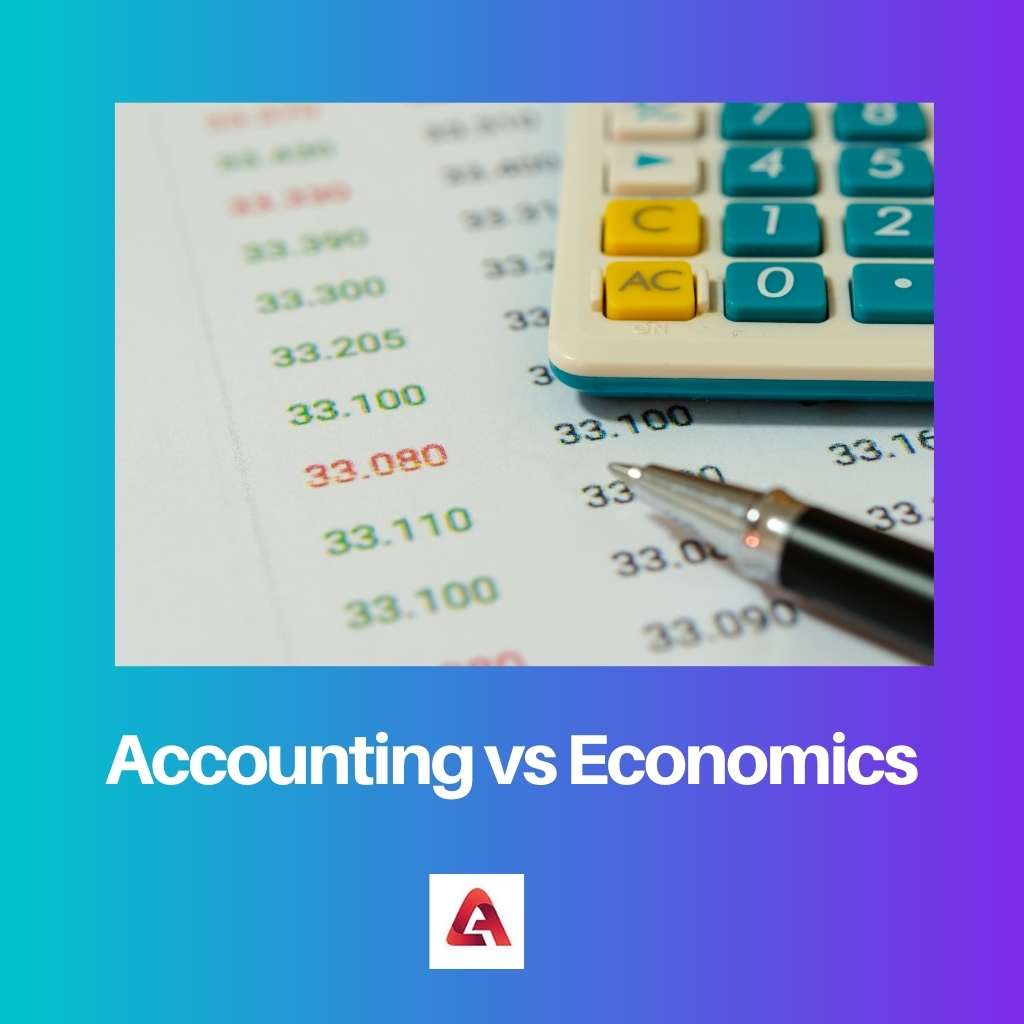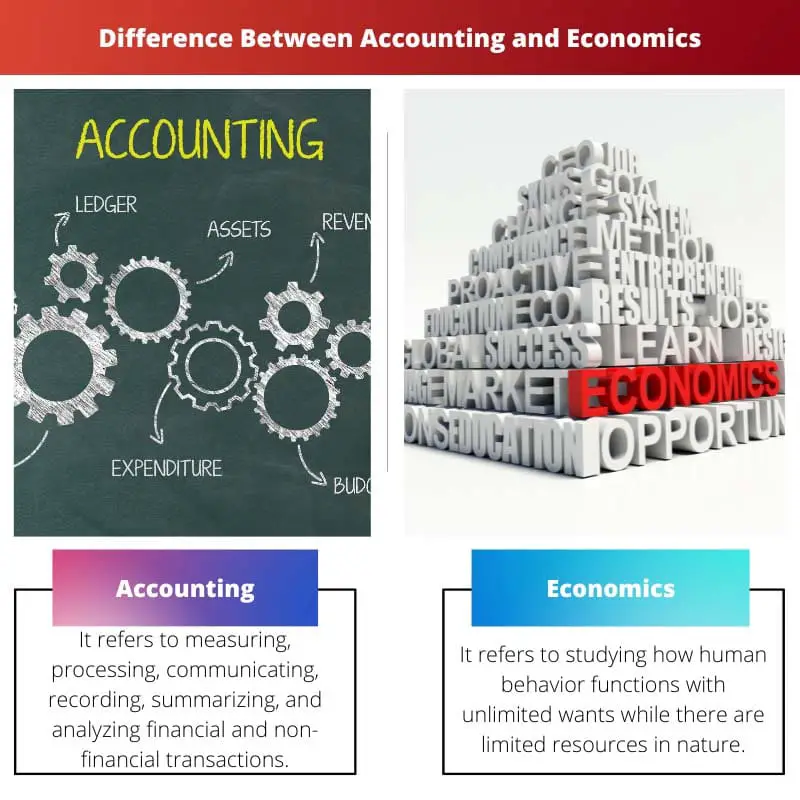Accounting and economics are two vast concepts related to finance. They are extensively used in businesses and other organizations and are vital for effectiveness and efficiency.
Sometimes, they even require to be intertwined for several operations and projects. However, they must not be confused to be the same thing. They have several distinguishing factors.
Key Takeaways
- Accounting is the process of recording, analyzing, and communicating financial information about an organization, enabling informed decision-making and compliance with regulations.
- Economics is a social science that studies how societies allocate resources to meet their needs and want, examining the production, distribution, and consumption of goods and services.
- Accounting focuses on the financial aspects of individual businesses or organizations, while economics analyzes the broader market and societal behaviors and trends.
Accounting vs Economics
The difference between accounting and economics is that accounting is a specific practice in which the monetary transactions taking place in any kind of organization are recorded and presented for analysis whereas economics is a broad concept of social science that studies how limited resources in nature are used by the society.

Accounting is also commonly known as accountancy. It is a practice in which an accountant measures, processes, communicates, records, summarizes, and analyses various transactions that occur in an economic entity.
These transactions may be financial or non-financial. Due to this, accounting is referred to as ‘the language of a business.’
Meanwhile, economics is a field of study rather than a practice. It involves various aspects such as production, consumption, distribution, demand, supply, and much more.
All of these relate to goods and services. Since they are limited in nature and scarce, economics also studies how humans behave in such a situation.
Comparison Table
| Parameters of Comparison | Accounting | Economics |
|---|---|---|
| Meaning | It refers to the practice of measuring, processing, communicating, recording, summarizing, and analyzing financial and non-financial transactions. | It refers to studying how human behavior functions with unlimited wants while there are limited resources in nature. |
| Aim | It aims at reporting how wealth is maximized in an economic entity. | It aims at studying how to optimize the maximization of wealth. |
| Nature | It is practical. | It is theoretical. |
| Regulations | It constitutes rules, guidelines, regulations, etc. issued by an authoritative agency. | It does not have any standards. |
| Flow of Money | It keeps track of how money flows in an organization. | It studies all the forces that affect the flow of money in an organization. |
What is Accounting?
Accounting is a practical concept that almost every organization performs. Its aim is to keep track of how money flows in an organization.
In doing so, the maximization of wealth can be reported, which further represents how well the organization is performing. All the transactions, be it monetary or non-monetary are taken into consideration.
However, an important feature of accounting is that it follows rules, regulations, and guidelines. This allows organizations all over the world to follow a common and easy method of practice.
Moreover, it sets standards that decide an optimal way of representing the balance sheet at the end of the year.
Interestingly, there are several fields of accounting that work with different aspects of a business. Some of them include cost accounting, financial accounting, management accounting, tax accounting, etc.
Each of them is designed specifically with certain aims. This further supports the overall practice of accounting.
Regardless, this practice has been used for thousands of years, even in ancient civilizations. In its earliest form, it involved bookkeeping, which was not as efficient.
It was time-consuming and required a considerable amount of manual labor. However, things have changed with the advancements in technology. Nowadays, all of this can be done digitally, which also saves the difficulty of storing records.

What is Economics?
Unlike accounting, economics is theoretical. It is more about gaining knowledge of human behavior in times of scarcity. It also includes studying how different factors affect human behavior, and ultimately the flow of money in an organization.
Concepts such as production, consumption, demand, supply, and distribution of goods and services are given major importance.
Another factor that differentiates economics from accounting is that it does not involve any universal standard. There are no rules, regulations, or guidelines that need to be adhered to during the study.
However, the concepts that are being studied may include certain equations that are true for all.
These concepts are majorly divided into two fields – microeconomics and macroeconomics. Microeconomics deals with the basic and minute elements that support the functioning of an economy.
In contrast, macroeconomics deals with the overall system in which different economies function.
Like accounting, economics has been around for a very long time. It can be traced back to Greek, Chinese, Persian, Roman, Indian, and even Arabic societies. Since its earliest form, the study has evolved massively.
Nowadays, people even research their way into professionalism in the subject. There are various industrial sectors that hire these people to make sure that the strategies for wealth creation are sound and legitimate.

Main Differences Between Accounting and Economics
- Accounting refers to the practice of measuring, processing, communicating, recording, summarizing, and analyzing financial and non-financial transactions whereas economics refers to studying how human behavior functions with unlimited wants while there are limited resources in nature.
- Accounting aims at reporting how wealth is maximized in an economic entity whereas economics aims at studying how to optimize the maximization of wealth.
- Accounting is practical whereas economics is theoretical.
- Accounting constitutes rules, guidelines, regulations, etc. issued by an authoritative agency whereas economics does not have any universal standards.
- Accounting keeps track of how money flows in an organization whereas economics studies all the forces that affect the flow of money in an organization.

- https://www.jstor.org/stable/246843
- https://books.google.com/books?hl=en&lr=&id=wiaQDwAAQBAJ&oi=fnd&pg=PA5&dq=accounting+vs+economics&ots=-h3-poGttD&sig=r6fKU984_R6nvSq6I5NnW91Q59U

The comparison table is especially helpful to dissect and understand the differences between accounting and economics
This information provided is useful in differentiating between the technical aspects of accounting and economics
This article provides valuable insight into the distinctions between accounting and economics, great read!
Very interesting. It’s essential to understand the fine line of difference between accounting and economics
This is a really informative article, I love how it explains the differences between accounting and economics
This article really breaks down the technicality of both concepts in a comprehensive and profound manner